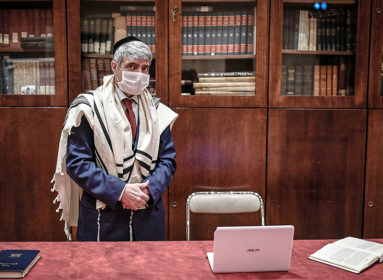In his debut novel, a Newington native touches on his own Jewish journey
By Alex Putterman
 Andrew Tertes began writing Jacob’s Return in 1998. Fifteen years and an intercontinental uprooting later, the author is coming home to Connecticut, published book in hand.
Andrew Tertes began writing Jacob’s Return in 1998. Fifteen years and an intercontinental uprooting later, the author is coming home to Connecticut, published book in hand.
Jacob’s Return, the author’s debut novel, follows Jacob Goldman through his marriage to a Native American woman, as he struggles to define his relationship with God. His internal conflict takes Jacob on an extended spiritual adventure, during which, with help from his wife, he attempts to come to terms with his religion. Tertes says that as he wrote the story, he himself didn’t know what would happen next, allowing his characters’ journeys to develop organically.
Tertes, 46, developed an interest in writing as a second grader at Elm Hill Elementary School in Newington, where he grew up. He cultivated that passion throughout his school years and beyond, participating in writing workshops throughout his young adulthood.
In 1998, Tertes began work on what would become Jacob’s Return, conducting research and writing initial drafts. Tertes was satisfied with his work and ready to have the story published in 2005, but struggles with an agent and a trip to Israel, where Tertes met his wife and now lives, delayed the process. Finally, Jacob’s Return was published in March 2010 by Sapphire Ink Press.
On August 20, Tertes will be back in Connecticut, speaking at the Mandell JCC in West Hartford in a free event open to the community.
Recently, the Ledger spoke with Tertes about his new book.
Q: Can you tell us a bit about the premise of your book?
A: Jacob is a secular Jewish man who lives in San Francisco, who grew up Conservative and really had a falling-out based on a serious misjudgment by a teacher of his. As an adult, he’s an investigative journalist and culturally Jewish but very distant from Judaism. His wife is a Native American woman from a California, San Joaquin Valley tribe, and she’s very involved in her tribe’s spiritual heritage and had always been nudging Jacob to find his Jewish God. And he’s been reticent about that.
So that’s where the novel starts, with two teenage children – a boy and a girl – who identify more with their mom, because she’s strongly involved with her heritage, and he really is not. The book sets out in Hawaii, which is an important place, particularly for Sheila, Jacob’s wife. There’s a crisis that happens that really pushes Jacob and his family to readjust everything in life and him particularly his career, which is environmental justice-focused but has really weaned for him because of his self-doubt and the question of his impact in the world. He has to reevaluate that, and also his own spiritual journey, his religious journey.
Q: To what degree, if any, are your own experiences reflected in Jacob’s struggles?
A: That’s a question that I was asked the whole time I was writing and publishing the novel. For me, I look at it from the other side which is, in order to know who Jacob was – he’s in his mid-forties, I was early thirties when I started writing the novel – I had questions about the tribalism which is vibrantly active still in many Native American tribes, but seems to me has been lost in Judaism. So, I had a lot of curiosity. I had to do a lot of research once I began the process and, in learning about Jacob, I met a number of people involved in what’s called the Red Road – people who are Native American or part Native American and involved in tribal spirituality. I was invited to participate in a sweat lodge – a three-day four-night fast, prayer dances and other events – which I participated in as my own research. It influenced me and it influenced the story. So, in a way I was always seeking to know who Jacob was. By following him in that path, I had amazing experiences on my own journey.
Q: What was your relationship with Judaism growing up in Connecticut?
A: I went to B’nai Shalom in Newington and had a very strong connection with the Hebrew language, with holidays and Israeli dance. I was shy and I was the only boy in Israeli dance, so I ended up quitting. I had excellent [religious school] teachers when I was young who inspired me. We weren’t a religious family. We were very much [focused on] Passover and high holidays, but I identified as a Jew. I did have my own falling-out [with Judaism], which was not as dramatic as my protagonist’s, but for me it was very strong and jarring, and it took a long time for me to be open again and really explore Judaism. I spent time with a Connecticut rabbi, Andrea Cohen Kiener, who was my mother’s teacher at the time, and she gave me perspectives that helped me as an adult to look at different denominations and also some of the non-denominational Jewish paths that later did interest me. A lot of my research and interest in my story was a way for me to do a lot of personal searching and come up with an adult perspective and practice.
Q: In terms of Jacob’s relationship with his wife, you seem to be suggesting there can be value to intermarriage. Is that accurate?
A: I’m not encouraging intermarriage. I’d say the story is a non-judgmental exploration [posed] as a question: What would happen to a non-religious Jewish man who is married to what is in effect a religious woman, someone whose focus is on her roots and who sees the importance for her partner to explore his roots? What’s most important in the story is it’s someone who is not looking at one group as “my group’s better than your group” but is looking at someone’s essence or someone’s core. I definitely encourage someone to be with someone who’s encouraging them to be more of themselves.
Q: How has feedback on the book been?
A: I’m very happy with the book and the response to the book. I expected there to be more focus on my skills of description and certain elements of writing, but the foremost response by readers has been how they’ve been inspired in their own personal journeys, either religiously or spiritually.
[The reviews have been} mostly positive. The San Diego Jewish World compared the journey of Jacob with that of some classic hero journeys, saying that if you’re hoping to get to the end to find out does the character succeed in his journey, it’s the wrong question. The question is, it’s such a strong journey, what’s the journey made of and how does he make it? That was valuable to hear, and affirming for me. Someone wrote to me that her father passed and that she actually bought the book during the time of mourning and that she found solace in that. So, I have many various responses that people have used it in a very strong way. Then of course there are those who are just reading it for pleasure and have been very pleasantly surprised with the story.
Q: What can we expect from your talk at the JCC?
A: Rabbi Debra Cantor knows me. I’ve spent time with her in the U.S. and in Israel, and she knows my family. She’s going to introduce me, and I’ll give a reading, and she’ll open up a question-and-answer session, both about the book and anything the audience wants to ask me. It should be a wonderful experience because there will be a number of people there who knew me. I will be inviting some of my writing teachers from Connecticut. I’m really looking forward to it.
For me, this really is a return to my community, where I first learned about Judaism. I’m very happy about how I’m returning; that I’m returning with the gift of this book, and much more comfortable with the Judaism that I received as a child, having filtered it through a long process. It was a very long wrestling process, and I’m very pleased to be coming back.
Comments? email alexp@jewishledger.com.








 Southern New England Jewish Ledger
Southern New England Jewish Ledger









